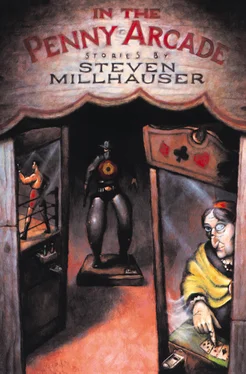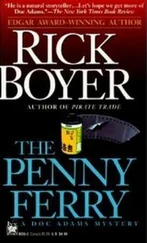August left that night, taking with him half his creatures and leaving behind enough of them so that Hausenstein might continue operating the Zaubertheater if he wished. After all, it had been paid for with his money. August felt no desire for revenge, only a compelling need to be alone. He never saw Hausenstein again. At this point his recollections became brisk and fragmentary: he wandered with his creatures from town to town, renting small halls where he could, and staging performances in makeshift miniature theaters that were sometimes little more than a large empty box with a single hastily painted backdrop and a crude lamp that threw distorting shadows. The performances were sometimes well attended, but the audiences were generally scanty and a little confused. People seemed to come out of curiosity, as they might come to see a ventriloquist, a Fireproof Female, or a magician, and the Automaton Theater left them with a feeling of puzzlement, as if they had expected something else, something a little different. Hausenstein was right: automatons were dead. Here and there a face lit up with enchantment and understanding, and once a young woman burst into tears during a performance of Pierrot , but far more often there was coughing, a creaking of seats, a fanning of flushed cheeks. Once he heard someone say, “It must be some sort of trick — that box must have a false bottom.” Tired, always tired, he moved from town to town; often he thought of the magician in the drab green tent. Yes, the art of the automaton was a magical art, for when all was said and done there was something mysterious and unaccountable about clockwork: you breathed into the nostrils of a creature of dust, and lo! it was alive. And so the art of clockwork was a high and noble art: the universe itself had been constructed by the greatest clockwork master of all, and remained obedient to mysterious laws of motion. And on the moving earth, all was ceaseless motion: wind and tide and fire. One day, coming to still another town, August read everywhere of preparations for a fair. And he was pleased: in the rented tent, not green but yellow-brown, he displayed his automatons before children.
He decided to return to Mühlenberg; perhaps he could take up his old trade. But first he wanted to pay a visit to Berlin. He arrived at night and went with wildly beating heart to the Zaubertheater, but the Zaubertheater was no longer there. A small, flourishing restaurant stood in its place, but so transformed in look that he had to stare very hard to be certain. The doorway had been widened and replaced with glass, a glass window had been built into the outer wall, the corridor wall had been torn down, and the stage itself had vanished into thin air. Only the old florid decorations high up on the ceiling remained to tell their tale. August was not unhappy. He would have liked to order a light dinner with a glass of wine — the hake looked first-rate — but the menu in the window was forbidding. A woman inside looked up at him with a frown; he stepped away from the glass. His coat was shabby, his hair long and unclean. On an impulse he decided to seek out the Black Boot, but that too was gone: in its place was a night club of a somewhat shady kind. Hausenstein was right: they were deader than a doornail. He thought of paying a visit to the Preisendanz Emporium but was suddenly afraid it might not be there; he wanted something to remain. He took the last train that night.
The train for Mühlenberg does not go as far as Mühlenberg itself, but stops at Ulmbach before continuing to the southwest. At Ulmbach August learned that the coach would leave in forty-six minutes. It was a sunny afternoon. Leaving his battered traveling bag at the coach house, but carrying his rope-tied suitcase of automatons, August took a walk to the back of the coach house and down to the small and nearly dry river, spanned by a wooden bridge. On the other side of the river was a small wood, beyond which he saw factory smokestacks. He crossed the bridge into the wood, spotted with sunlight. He looked for a shady place where he might sit down and eat the pear in his pocket. The wood was deserted; it appeared to be dying. He found a shady spot under a broad, decaying tree. He recognized it as a linden and thought, Hausenstein would have said something witty about that: Unter den Linden. He kicked away a mulch of old leaves covering its half-exposed roots. Sitting down wearily between two roots and half-closing his eyes, he felt shut away peacefully from the river and the factory. He noticed that his suitcase was half-sunk in the leaves and shifted it slightly. There were many leaves lying about, brown leaves and green leaves, and leaves that were green and brown together. August had a sudden idea. Laying the suitcase on its side, he began covering it with leaves. It was done quickly: the leaves had been lying in a depression, and the suitcase was well buried.
For it often happens that way: Fate blunders into a blind alley, and even an entire life can be a mistake. Perhaps one day a child, playing in the leaves, would discover a funny old suitcase. August leaned back against the linden and tried to understand. Was it really his fault that the world no longer cared about clockwork? He supposed it was: Hausenstein had explained it all to him a dozen times. But was beauty subject to fashion? He did not understand. What was a life? One day his father had opened the back of a watch and shown him the wheels inside. Was that his life? A bird inside a funny paper man, the boats in the picture that suddenly began to move, a perspiring magician in a drab green tent — were these the secret signs of a destiny, as intimate and precise as the watermark on a postage stamp? Or were they merely accidents, chosen by memory among the many accidents that constitute a life? He tried desperately to understand. Had it all been a mistake? His art was outmoded: the world had no need for him. And so it had all come to nothing. He had given his life away to a childish passion. And now it was over. He was terribly tired. Sitting under the warm shade of the linden, August grieved for his lost youth. Slowly his eyes closed, and his head fell forward.
August woke with a start. The sun shone brightly through the leaves of the wood. He had dreamed of his rooms in the boarding house near the Preisendanz Emporium. He took out his watch: he hadn’t missed the coach. It was warm in the shade. A thrush landed on a branch of the linden, paused as if looking for something, and flew away. Suddenly August looked about in alarm. Where was his suitcase? Where? Stolen while he slept? Thieves in the wood? How? Where? He remembered.
He replaced the watch in his pocket and leaned back against the linden. His heart was beating quickly, and he noticed that a hand was trembling. It was warm in the shade. Two factory smokestacks showed bright white through the trees. August felt that he needed to rest for a long time. But his little nap had refreshed him.
A short while later, he picked up his suitcase and started back to the coach house.
A Protest Against the Sun
It was an absolutely perfect day. Her father at once objected to the word, looking at her over the tops of his glasses and nodding morosely in the direction of a loud red radio two blankets away. Elizabeth laughed, but she knew exactly what she meant. She meant the day was so clear that you could see all the way across the Sound to a tiny cluster of three white smokestacks on blue-green Long Island. She meant the far-off barge, moving so slowly it was barely moving. It was the rich dark color of semisweet chocolate. She meant the water, dark blue and crinkled out there, smooth and greenish brown between the sandbar and the beach. She meant that yellow helicopter, flying high over the water toward the Sikorsky plant. She meant that orange-and-white beach ball, that grape-stained Popsicle stick, that brilliant green Coke bottle half-buried in the sand. A white straw was still in it. She meant that precise smell: suntan lotion, hot sand, and seaweed. She meant the loud red radio. She meant all of it.
Читать дальше












